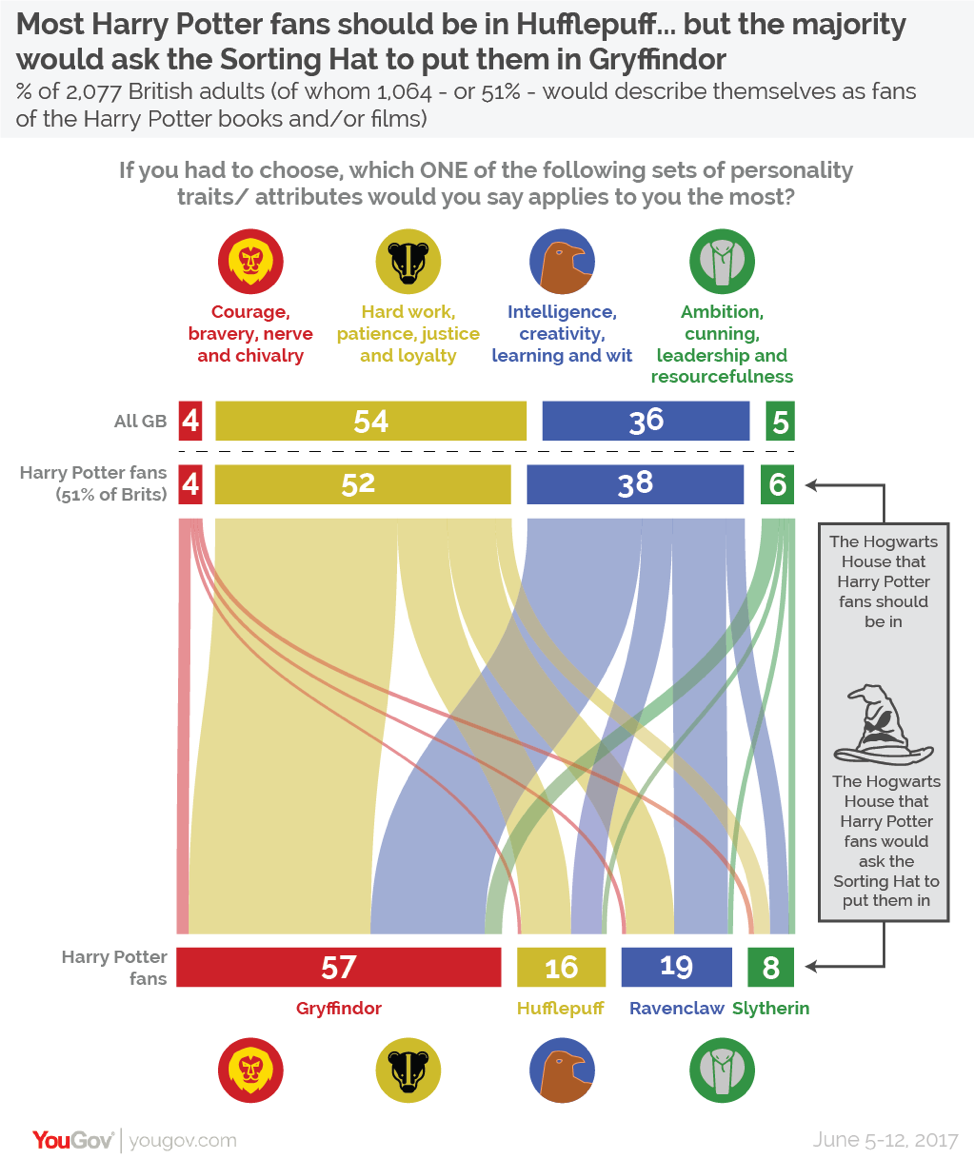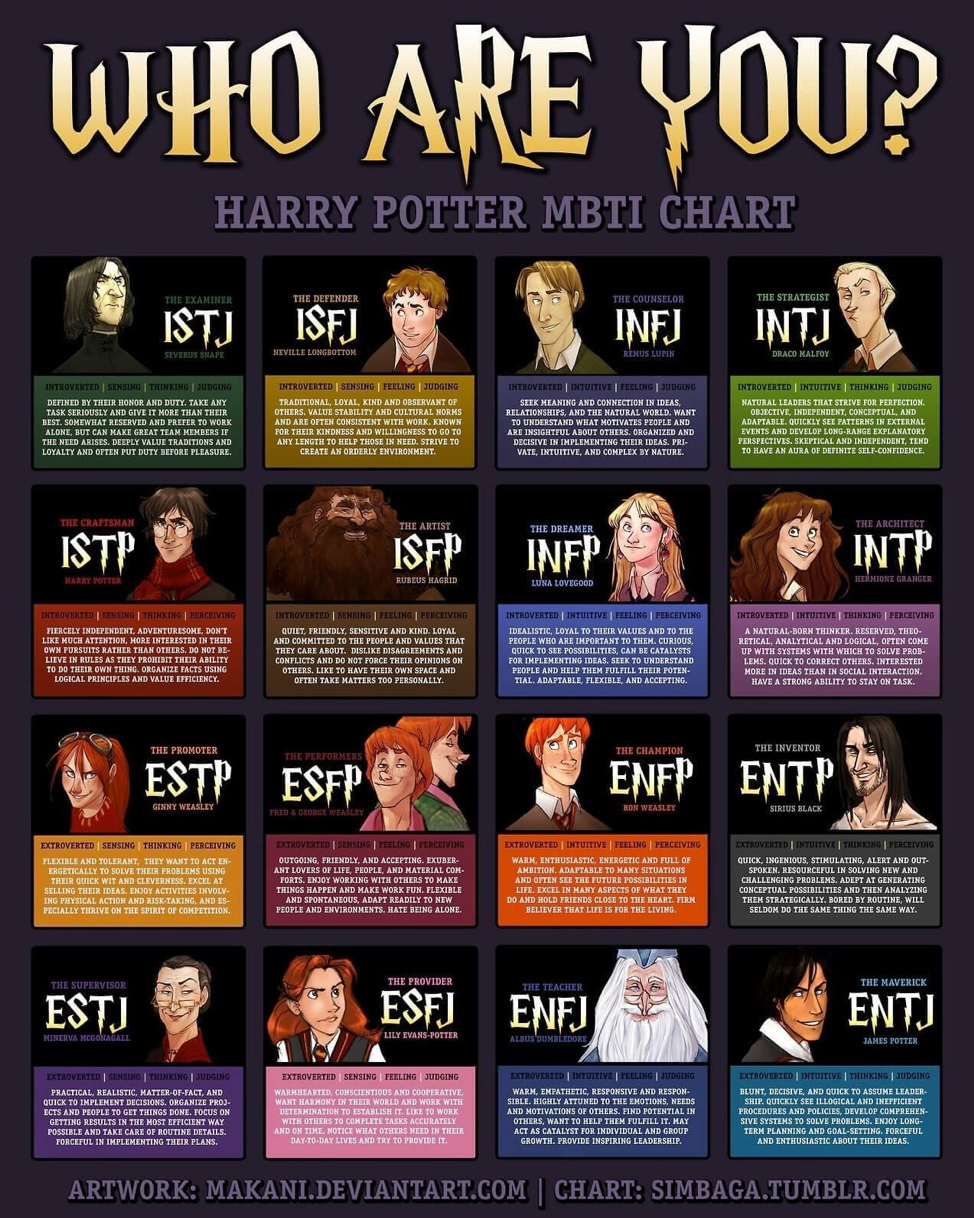On the Psychology of Your Harry Potter House
Does your Harry Potter House tell us anything about your personality? Psychology says… (we’ll get to that after some background info :)
The first of JK Rowling’s books Harry Potter and the Sorcerer’s Stone was released in 1998. Since then, 500 million Harry Potter books have now been sold worldwide, raking in $7.7 billion from the box office for its 8 movies, opening numerous theme parks, a play (Harry Potter and the Cursed Child), and spin-off movies (Fantastic Beasts). Altogether, it’s a $25 billion franchise.
This is all to say that you are probably at least a little bit familiar with Harry Potter and the world created by JK Rowling. Heck, you might even be a fan. 81% of 18-24 year olds and 68% of 25-34 year olds are.
In case that you’re not, or that you’ve been living under a rock, an important piece of information is that Harry Potter attends Hogwarts School of Witchcraft and Wizardry. According to the site Pottermore, “Hogwarts was founded over a thousand years ago by four powerful wizards: Godric Gryffindor, Salazar Slytherin, Rowena Ravenclaw and Helga Hufflepuff. They chose to split the students into four ‘houses’, each bearing their surnames and featuring young wizards and witches who displayed abilities and personalities they wanted to nurture.” Each new student is assigned to a house upon their arrival by the Sorting Hat.
If you haven’t experienced the fun of finding out your Harry Potter house through a personality quiz, we here at Behavioural Sassonomics are here to help! We’ve developed our own quiz based on some actual psych research. Keep reading or check it out below!
Ravenclaws exhibit intelligence, creativity learning and wit. Learn more about Ravenclaw personality traits in our new blog post!
Gryffindors possess courage, bravery, nerve and chivalry. Read more about Gryffindors and their personality here!
Slytherins have ambition, cunning, leadership and resourcefulness. What are the hallmarks of Slytherin psychology? Find out here!
Hufflepuffs are the bearers of hard work, patience, justice and loyalty. Find out what it means to be on Team Hufflepuff here.
Fans of the series have been known to ask others the loaded question of “what Harry Potter house are you in?” Otherwise known as what tribe do you belong to? And what kind of a person are you?
*And if people answer that they don’t know, well then, they’re probably a muggle.
How do you know what house you’re in? Although each of the fictional characters in the book belongs to one of these houses, I urge you to remember that this metric of personality is from a fantasy book.
There Is No Real Life Sorting Hat - Or is there?
For all of us who didn’t get our letter to Hogwarts on our 11th birthday, you too can learn your true house by completing a number of quizzes online. There is the official quiz on Pottermore, known as the Sorting Hat Experience, created by JK Rowling herself. Alternatively, try this one that is sanctioned by Time Magazine.
Though the houses are equally distributed within the Hogwarts population, 54% of Britons self-identify as being Hufflepuffs, and 36% are Ravenclaw. That said, most wish to be Gryffindor (57%).
Interesting… as this mimics some of the qualities of many personality assessments – a central body of expertise (aka JK Rowling’s quiz) that purports to know you even better than you know yourself – telling you the ‘truth’ about who you really are rather than who you would want to be.
This perception of Harry-Potter-Houses-as-Truth as a shorthand for certain types of qualities has even flooded over to the perception of company values.
Is There Any Truth To Your Harry Potter House?
Laura Crysel, an assistant professor of psychology at Stetson University, is a lead author on a study that looked for connections between results of the Sorting Hat Quiz and the scientifically accepted personality framework known as The Big Five (Openness, Conscientiousness, Extroversion, Agreeableness, Neuroticism).
Holding these fiction books as a source of truth shows us something – fiction might act as a primary source for people’s beliefs about their own worlds. It’s not just that these books are fun and we want them to be true, we actually make them true.
Laura’s study, published in Personality and Individual Difference, did indeed find some relationships between participants’ house assignments and their scores in scientifically accepted measures of personality including The Big Five, The Dark Triad (narcissism, Machiavellianism, and psychopathy), need to belong and need for cognition. Ravenclaws correlated with need for cognition (known for being the brainy house), and between the Dark Triad traits and belonging to Slytherin (known for using any means to achieve their ends).
Unfortunately for the hopeful Potterheads, there was no significant correlation between Gryffindor or Hufflepuff and the personality dimensions tested. Furthermore, Jakob et al (2019), replicated the study with more participants and although they found similar-ish results, the effect sizes were really, really tiny (basically the finding was really weak!), and goes away completely when they looked only at participants who were sorted into a different house than the one they wanted.
The Quizzes Aren’t Reliable Sources For The Truth About Our Personalities
Perhaps the Sorting Hat isn’t looking at your current appearance of character traits and strengths, but rather your unique motivations that lie beneath. According to Harvard Business School professors Paul Lawrence and Nitin Nohria’s book Driven: How Human Nature Shapes Our Choices, the holistic and humanistic theory of motivation can be divided into four categories: the drive to acquire, to bond, to learn, and to defend. Sounds a lot like Slytherin, Hufflepuff, Ravenclaw, and Gryffindor respectively, eh? Maybe the Hogwarts House framework can help us identify what’s driving us to fulfillment, rather than who we are right now, and how we can harness that to find satisfaction and wellbeing in our daily lives.
In Summary – Harry Potter House Quizzes Are Just For Fun
They don’t define you. Despite the alluring appeal of knowing yourself better, but the results don’t predict your behaviour, feelings, or license you to be a jerk “just because you are a Slytherin”.
Personally, I find no consistency between the results of the various quizzes that I have taken over the years. I have received results that say I am Ravenclaw, Gryffindor, and Hufflepuff. Yet, I know in my heart that I am a Slytherin. I love to make plans, be strategic, find creative ways to be resourceful and display loyalty. More than that, my Slytherin friends and I bond over our ways. When I make an especially good plan, I like to thank my Slytherin nature. But it always leads me to the question: is my plan good because I am a Slytherin, or did me thinking I have the qualities of a Slytherin impact my openness to and thinking about plans? I’ll leave answer up to you, dear reader.
That’s all for now muggles,
Dr. D
P.s. Just for fun, okay?
References
Ash, Lucy. (2012, July 6). Personality tests: Can they identify the real you? BBC. https://www.bbc.com/news/magazine-18723950 Campbell, J. D., Trapnell, P. D., Heine, S. J., Katz, I. M.,
Lavallee, L. F., & Lehman, D. R. (1996). Self-concept clarity: Measurement, personality correlates, and cultural boundaries. Journal of personality and social psychology, 70(1), 141. Crysel, L. C., Cook, C. L.,
Schember, T. O., & Webster, G. D. (2015). Harry Potter and the measures of personality: Extraverted Gryffindors, agreeable Hufflepuffs, clever Ravenclaws, and manipulative Slytherins. Personality and Individual Differences, 83, 174-179.
De Raad, B. (2000). The Big Five Personality Factors: The psycholexical approach to personality. Hogrefe & Huber Publishers.
Fayard, J. V. (2019, September 27). Why Do We Like Personality Tests, Even the Bad Ones? Psychology Today. https://www.psychologytoday.com/ca/blog/people-are-strange/201909/why-do-we-personality-tests-even-the-bad-ones
Fisher, R. J. (1993). Social desirability bias and the validity of indirect questioning. Journal of consumer research, 20(2), 303-315.
Klayman, J. (1995). Varieties of confirmation bias. In Psychology of learning and motivation (Vol. 32, pp. 385-418). Academic Press.
MacDonald, D. J., & Standing, L. G. (2002). Does self-serving bias cancel the Barnum Effect?. Social Behavior and Personality: an international journal, 30(6), 625-630.
Mason, O. J., & Budge, K. (2011). Schizotypy, self-referential thinking and the Barnum effect. Journal of behavior therapy and experimental psychiatry, 42(2), 145-148.
McCrae, R. R., & Costa Jr, P. T. (1989). Reinterpreting the Myers‐Briggs type indicator from the perspective of the five‐factor model of personality. Journal of personality, 57(1), 17-40.
Sanders, Linley (2019, June 13). Which Harry Potter Hogwarts House would America's celebrities be placed in? YouGov. https://today.yougov.com/topics/entertainment/articles-reports/2019/06/13/new-harry-potter
Smith, S. T., Smith, K. D., & Seymour, K. J. (1993). Social desirability of personality items as a predictor of endorsement: A cross-cultural analysis. The Journal of social psychology, 133(1), 43-52.
Vedantam, Shankar. (2017, December 4). The Sorting Hat [Hidden Brain]. https://www.npr.org/transcripts/568418089
Fair Use Copyright Disclaimer
This content may contain references to copyrighted material whose use has not been specifically authorized by the copyright owner. Under Section 107 of the Copyright Act of 1976, allowance is made for "Fair Use" for purposes such as education and research. This site and the content made available through this video are for educational and informational purposes only.






